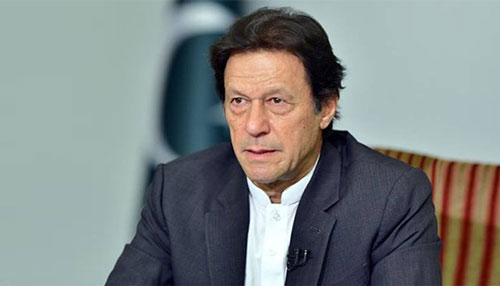Staff Reporter Islamabad
Prime Minister Imran Khan on Wednesday highlighted the dangers of global hunger and malnutrition affecting hundreds of millions of people, saying the world today faced a “looming agricultural crisis.”
While delivering a keynote address at the governing council of the International Fund for Agricultural Development virtually, the premier said agriculture was central to human survival and 600m people suffered from hunger even as the global population was about to hit eight billion.
“The world faces multiple challenges in recovering from the pandemic and achieving [the] vital first two sustainable development goals — no poverty and zero hunger,” Imran said, adding that there was a lack of financing, shortage of investment, trade distortions, unsustainable production and consumption patterns, degradation of agricultural lands and forests, an impending water crisis, loss of biodiversity, and polluted rivers and oceans.
“We need a revolution in our vision of our future. The Covid-19 pandemic and the climate crisis should drive home the message to all rich and poor, weak or powerful that their destinies are intertwined. We will perish or survive together,” he emphasised.
Prime Minister Imran stressed that the concepts of geostrategic adversaries, regional or global domination, of the political advantages of foreign intervention and occupation, and the oppression of peoples are “outdated and will soon be seen as irrelevant”.
“We need a common plan and strategy for global recovery and survival and prosperity of all humanity in response to the recession triggered by the Covid-19 crisis,” he said, recalling his proposal for a global initiative on debt relief last April.
While the debt suspension announced by the G20 countries and the emergency lending programmes of the World Bank, IMF and others have provided “some breathing space”, the prime minister said, the developing countries require $4.3 trillion to recover from the pandemic and achieve the SDGs, according to the latest estimates.
“We need to invest in sustainable agriculture infrastructure to facilitate transport, production and distribution of agricultural inputs and food products, for which the ‘green lanes’ created by China are a good example,” he said.
Imran said that governments need to more actively ensure adequate and fair prices for agricultural and food products. “The so-called magic of the marketplace should be balanced with a very visible hand of the state. We in Pakistan have suffered from market manipulations by monopolists and hoarders. Farmers should not be left to the mercy of the corporations; at the same time, international agricultural trade must be rationalised. The huge agriculture subsidies provided by certain richer economies distort global markets and make it impossible for farmers in the developing countries to compete,” the premier said.
The premier said the new and breakthrough agricultural technologies and techniques must be consciously applied to enhance food production, ensure efficient usage of water and land, and above all improve seed quality. IFAD and the FAO can play an important role in this context.
The adoption of digital technologies is as vital in agriculture as in other economic sectors. Ensuring internet and broadband access to the rural areas will be vital for their integration into national and global supply chains, he said.










